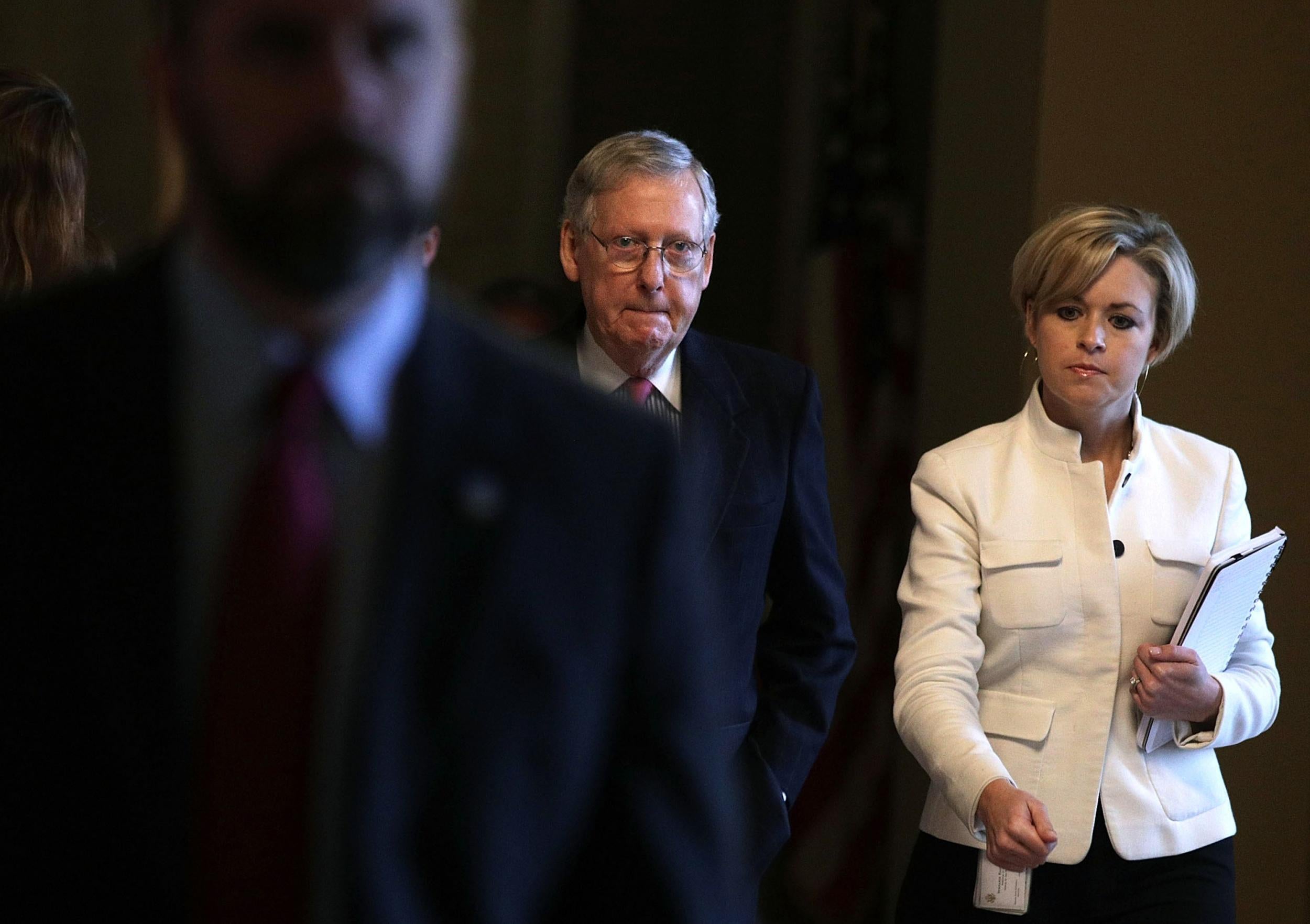Democrats filibuster forces Republicans to use 'nuclear option to confirm Trump's Supreme Court pick
Democrats have stopped Neil Gorsuch’s nomination to the Supreme Court, for now

Republicans have taken the historic step of triggering the so-called "nuclear option" to change the rules of the Senate and push through Donald Trump's pick for the Supreme Court, after Democrats blocked the nomination.
After Democrats successfully filibustered Judge Neil Gorsuch, Republicans made the choice to forever alter the way judges are appointed to to the top court in the country.
Under normal circumstances, nominees are required to get at least 60 Senators to support their confirmation - the new procedure allows Mr Gorsuch and future Supreme Court nominees to be confirmed with a simple majority of 51 votes.
Confirmation of Mr Gorsuch in a vote sometime on Friday would represent Mr Trump's first major victory since taking office after setbacks on healthcare legislation and his blocked order to prevent people from several Muslim-majority nations from entering the United States.
“This will be the first and last partisan filibuster of the Supreme Court,” Republican Senate Majority Leader Mitch McConnell said on the Senate floor, accusing Democrats of trying to inflict political damage on Mr Trump and to keep more conservatives from joining the high court.
“In 20 or 30 or 40 years, we will sadly point to today as a turning point in the history of the Senate and the Supreme Court, a day when we irrevocably moved further away from the principles our founders intended for these institutions: principles of bipartisanship, moderation and consensus,” Senate Democratic leader Chuck Schumer said.
Mr Trump picked Mr Gorsuch after the late Justice Antonin Scalia's seat has been empty for more than a year. Mr Gorsuch's nomination was met with a number of criticisms among Democrats, chief among them was that Republicans did not allow President Obama's nominee for the same slot - Merrick Garland - to even get a hearing last year.
In invoking the option Republicans have made a historic change in the Senate and the way Supreme Court nominees are named by presidents as well as the way they are vetted. Some feel that more ideological candidates will now be able to get Senate support, possibly polarising a court that is meant to be the pinnacle of an independent judiciary.
But, Dr. Barbara Perry, Director of Presidential Studies at the University of Virginia’s Miller Center and a former Judicial Fellow at the US Supreme Court, told The Independent that she does not feel the rule change "will change perceptions of the jurists" on the Supreme Court.
Ms Perry explained that what has more of a potential impact on the nominee confirmation process was the precedent set by denying Mr Garland a confirmation hearing. "At what point in future presidencies will they be denied their constitutional authority to fill vacant seats on the Court?" she said.
The move is not totally unprecedented however. In 2013, then-Senate Majority Leader Harry Reid used the "nuclear option" to stop Republicans from using filibusters to block President Obama's lower court and cabinet appointees. It left Democrats with no filibuster options during Mr Trump's cabinet nominations earlier in the year.
Mr Reid left the filibuster rule for the Supreme Court in place.
Senate confirmation of Mr Gorsuch, 49, would restore the nine-seat court's 5-4 conservative majority, and enable Mr Trump to leave an indelible mark on the Supreme Court, as well as fulfill a top campaign promise. Mr Gorsuch could be expected to serve for decades.
A conservative-majority court is more likely to support gun rights, an expansive view of religious liberty, abortion regulations and Republican-backed voting restrictions, while opposing curbs on political spending. The court also is likely to tackle transgender rights and union funding in coming years.
In the end, three Democratic senators up for re-election in 2018 in states won by Trump last year - Indiana's Joe Donnelly, West Virginia's Joe Manchin and North Dakota's Heidi Heitkamp - broke with their party and voted with Republicans to bring about a confirmation vote, though they opposed the rule change.
Senator John Thune said on CNN that though a Supreme Court nominee has never been filibustered before, this "was not unexpected. No one is happy about it...but it is where we are." Mr Thune supports the rule change to confirm Mr Gorsuch.
Every current Justice on the Supreme Court received this "super majority" of votes for confirmation, including those who came up for consideration when opposing parties were in the White House and control of Congress.
Mr Gorsuch, if confirmed, could change that. Republicans hold the majority in Congress by a count of 52 to 46 Democrats and 2 Independents.
Subscribe to Independent Premium to bookmark this article
Want to bookmark your favourite articles and stories to read or reference later? Start your Independent Premium subscription today.

Join our commenting forum
Join thought-provoking conversations, follow other Independent readers and see their replies